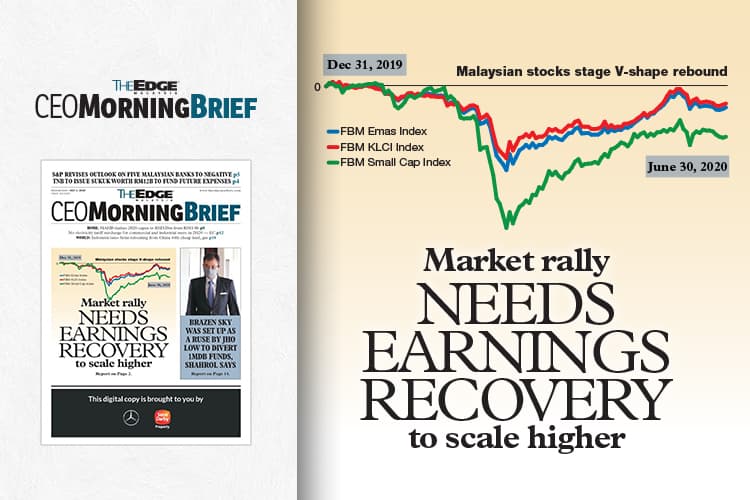
We wish to clarify that Phua Lee Kerk was speaking in his capacity as chief strategist at Phillip Research Sdn Bhd, and not as what the firm stated in an earlier version of this article.
KUALA LUMPUR (June 30): Expectations that 2020 will see green shoots were off as the Covid-19 outbreak shut down many parts of the world and threw the equity market a curveball.
The subsequent V-shape rebound in share prices worldwide after the bloodbath in March also caught many off guard simply because the patchy global economic outlook did not gel with the stock market rally.
The current low interest rate environment that has resulted in ample liquidity, however, spurred investing interest in equities globally.
The FBM KLCI is one of the top performing benchmark indices with a single-digit drop of barely 5.53% year to date. It rebounded 23% in just three months from the trough of 1,219.72 points in mid-March to end the first half of the year at 1,500.97 points — one of its sharpest rallies in history.
The liquidity-driven rally, according to investment analysts, has already factored in most good news, including an economic recovery in 2021.
As we enter into the second half of 2020, the pandemic is expected to remain as a central issue as the domino effect of its detrimental impact unfolds on the global economy.
Still, equity strategists and fund managers said, corporate earnings could be a wild card for equity price movements, with many appearing to have priced in a blue-sky scenario, with the rubber glove and semiconductor sectors being examples.
Phillip Research Sdn Bhd chief strategist Phua Lee Kerk said corporate earnings for the third quarter ending Sept 30, 2020 will be the main fuel for the current market rebound as the second quarter is already considered a washout due to the Covid-19 outbreak.
“Whether company earnings and guidance given are justified and support the notion of a V-shape recovery, or set the case for a gradual recovery [in business activities], [that] will be the key.”
“Should the latter happen, given the liquidity-driven forces that have pushed the market to frothy valuations, I expect the market to be volatile,” Phua said.
Inter-Pacific Securities head of research Victor Wan said the direction of the stock market will be highly dependent on the easing of the Covid-19 pandemic.
“If the pandemic eases, this will boost economic activities and economic growth, and in turn corporate earnings,” he said.
“There are too many 'ifs' and 'buts' at this point. There is no telling where it is going to go. But at this point, it does not look good,” Wan said, adding that a V-shaped recovery would be a long shot as the economic situation is still fluid.
After two consecutive years of disappointing corporate earnings performances, on top of recent meek first-quarter results, Wan said, "weak earnings are certainly here to stay."
TA Investment Management chief investment officer Choo Swee Kee, meanwhile, believes that economic activities will pick up speed significantly if a vaccine is developed much earlier than expected.
“With confidence returning to the market, the record liquidity released from the various stimuli would play a crucial part in spurring the market,” Choo added.
However, on the earnings outlook for the year, Choo expects another year of disappointment. He said the Malaysian economy had been performing below par for the past few years due to uncertainties revolving around government policies as a result of changes in government.
“This year is even worse, with a significant economic slowdown triggered by Covid-19,” he said, adding that the first-quarter numbers were an indication that the worst is yet to come — with the exception of gloves and healthcare companies.
Equities remain the preferred choice
Given the prevailing low interest rate environment, bonds and cash instruments do not appear to be attractive, said Inter-Pacific’s Wan, adding that asset allocation for the remainder of 2020 would be be “very tricky”.
While the equity market looks expensive, given the liquidity seen in the market now, the stock market remains the most attractive place for investors to park their money, said Wan.
TA’s Choo noted that investors are likely to look for yields to supplement the low interest rates. “Equities, especially dividend stocks and REITs (real estate investment trusts), will likely be favoured, while the more aggressive investors could seek capital returns in growth stocks,” he added.
Meanwhile, Phillip’s Phua prefers companies with solid dividend track records and strong balance sheets that can withstand the current harsh economic climate.
For him, as long as things get back on track, investors will be well compensated as most of the companies will continue to offer stable returns.

